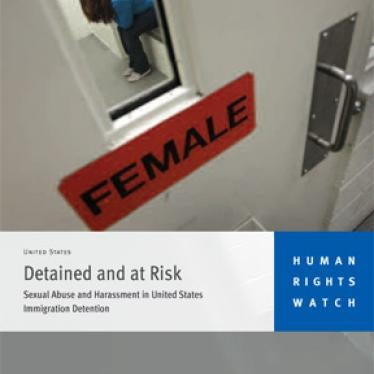(Washington, DC) – The US House of Representatives should move quickly to renew the Violence against Women Act (VAWA), Human Rights Watch said today. The US Senate, in a bipartisan vote on April 26, 2012, passed the bill, the primary federal law providing legal protection and services to counter domestic and sexual violence and stalking.
“Today women’s safety won out over partisan politics and the Senate united to renew the Violence Against Women Act,” said Meghan Rhoad, women’s rights researcher at Human Rights Watch. “The House should come together and stand up for the rights of all women and their families to live lives free from violence.”
The VAWA supports victim services such as rape crisis centers, temporary housing for domestic violence survivors, and programs to address violence against people with disabilities. Congress has reauthorized the VAWA twice since it originally passed in 1994.At a time when states are slashing their budgets, the funding is especially critical for the survival of these programs, Human Rights Watch said.
The bipartisan reauthorization bill (S. 1925) passed the Senate with 68 votes in favor, including the votes of all Senate Democrats and 15 out of 47 Senate Republicans. The bill was introduced by Senator Patrick Leahy, Democrat of Vermont, and Senator Mike Crapo, Republican of Idaho, with an additional 59 co-sponsors. The Senate rejected a substitute proposed by Republican Senators Kay Bailey Hutchinson of Texas and Charles Grassley of Iowa. The substitute would have weakened protections for immigrant victims of violence, victims of violence on native and tribal lands, and lesbian, gay, bisexual, and transgender victims of violence, Human Rights Watch said.
The House has yet to consider a bill to renew the VAWA. Republican lawmakers in the House announced on April 25, 2012, that they are drafting a bill similar to the substitute offered by Senators Hutchinson and Grassley. Representative Gwen Moore, Democrat of Wisconsin, has introduced a version of the VAWA in the House (H.R. 4271), but it only has Democratic co-sponsors, suggesting a more difficult path to reauthorization in the House.
“The vote today makes clear that there is no substitute for protecting all victims,” Rhoad said. “The bottom line is that no one should be trapped in a violent relationship, and no one should be afraid to report domestic violence, sexual assault, or stalking. The Senate bill ensures that critical protections and programs are accessible to everyone who needs them.”
According to December 2011 figures from the Centers for Disease Control and Prevention (CDC), one in four women in the US has been a victim of severe physical violence by an intimate partner in her lifetime, and nearly one in five has been raped. The CDC found that, on average, 24 people every minute are victims of rape, physical violence, or stalking by an intimate partner in the US.
Ensuring accountability for sexual and domestic violence through the criminal justice system is a cornerstone of the law. The bill provides continued funding for programs to address the nationwide backlog in testing hundreds of thousands of rape kits, which contain forensic evidence collected after sexual violence. National studies have shown that cases in which rape kit evidence was tested were more likely to proceed through the criminal justice system and lead to arrests.
The bill also fills important gaps in the country’s efforts to prevent and respond to violence against immigrant women, Human Rights Watch said. The bill would strengthen the U visa, a temporary visa allowing an immigrant victim of a serious crime to stay in the US to assist law enforcement in investigating and prosecuting the crime. Only 10,000 U-visas are available each year, but the new bill would allow up to 5,000 unused visas from previous years to be used after the annual cap is reached each year. In addition, stalking would be added to the list of serious crimes covered by the U visa.
The bill would also require the Department of Homeland Security to issue regulations to prevent sexual abuse in immigration detention centers. Despite clear congressional intent to cover immigration detention centers under the Prison Rape Elimination Act, proposed regulations currently exempt immigration detention facilities from any responsibilities under the Act.
Victims of abuse in immigration detention face a range of obstacles and disincentives to reporting, Human Rights Watch said. They include a lack of information about rules governing staff conduct, fear of speaking out against the same authority that is seeking their deportation, and trauma from the abuse in detention and possibly from violence and other abuse they have previously suffered in their countries of origin.
“Renewing the Violence against Women Act is about continuing the tremendous progress made since the landmark law first passed in 1994,” Rhoad said. “We’ve come too far to let partisan differences derail the single most important US law for women’s safety.”







